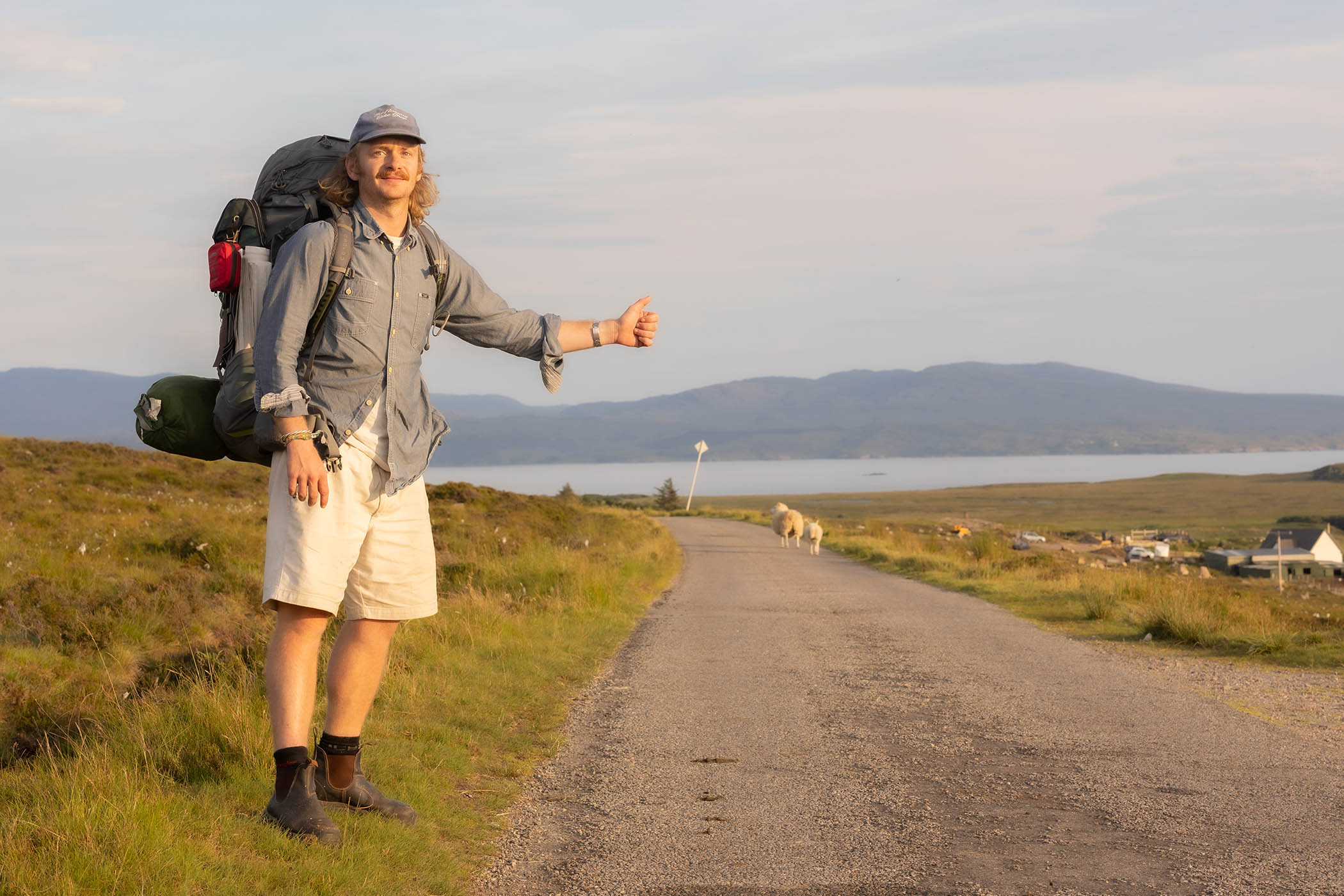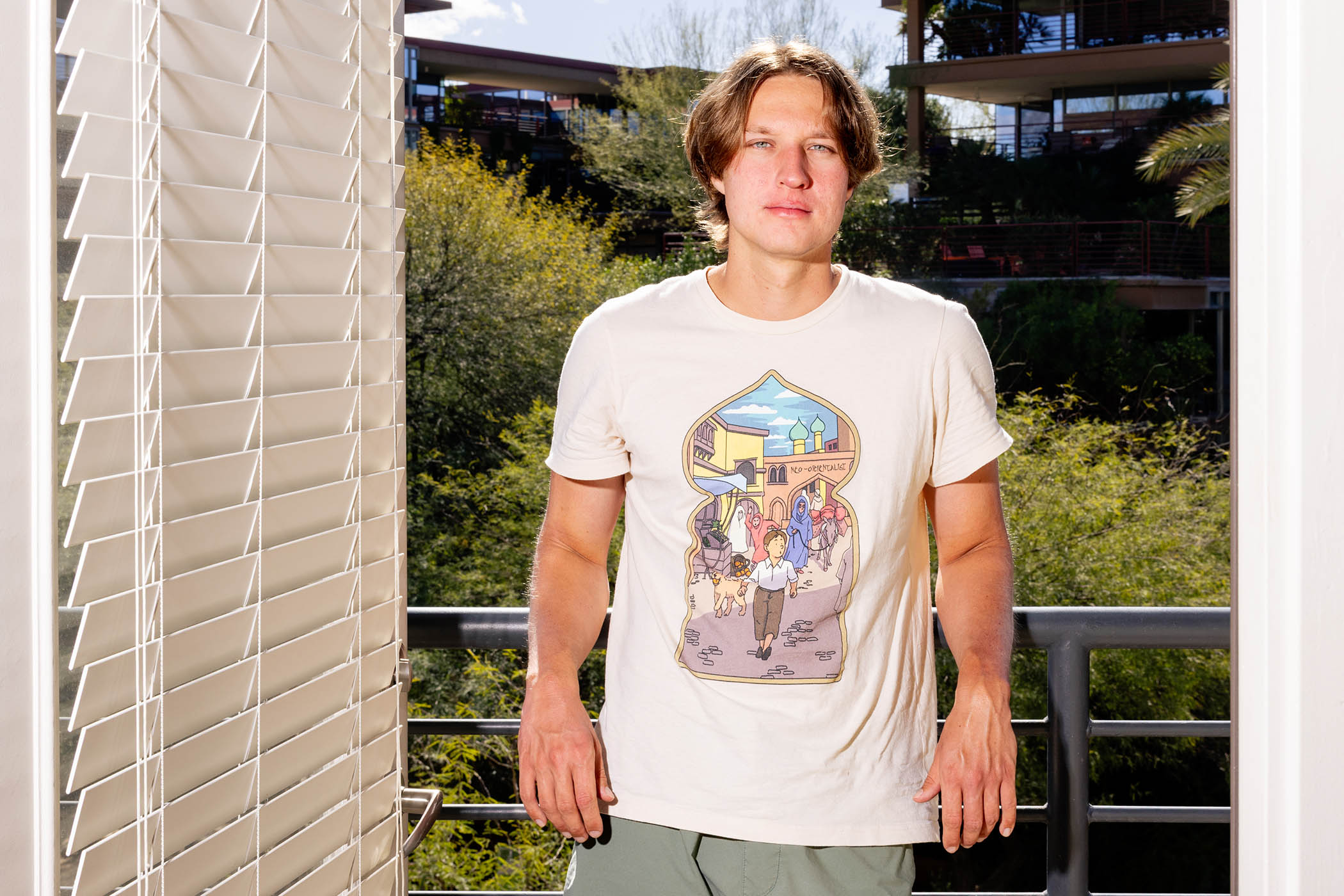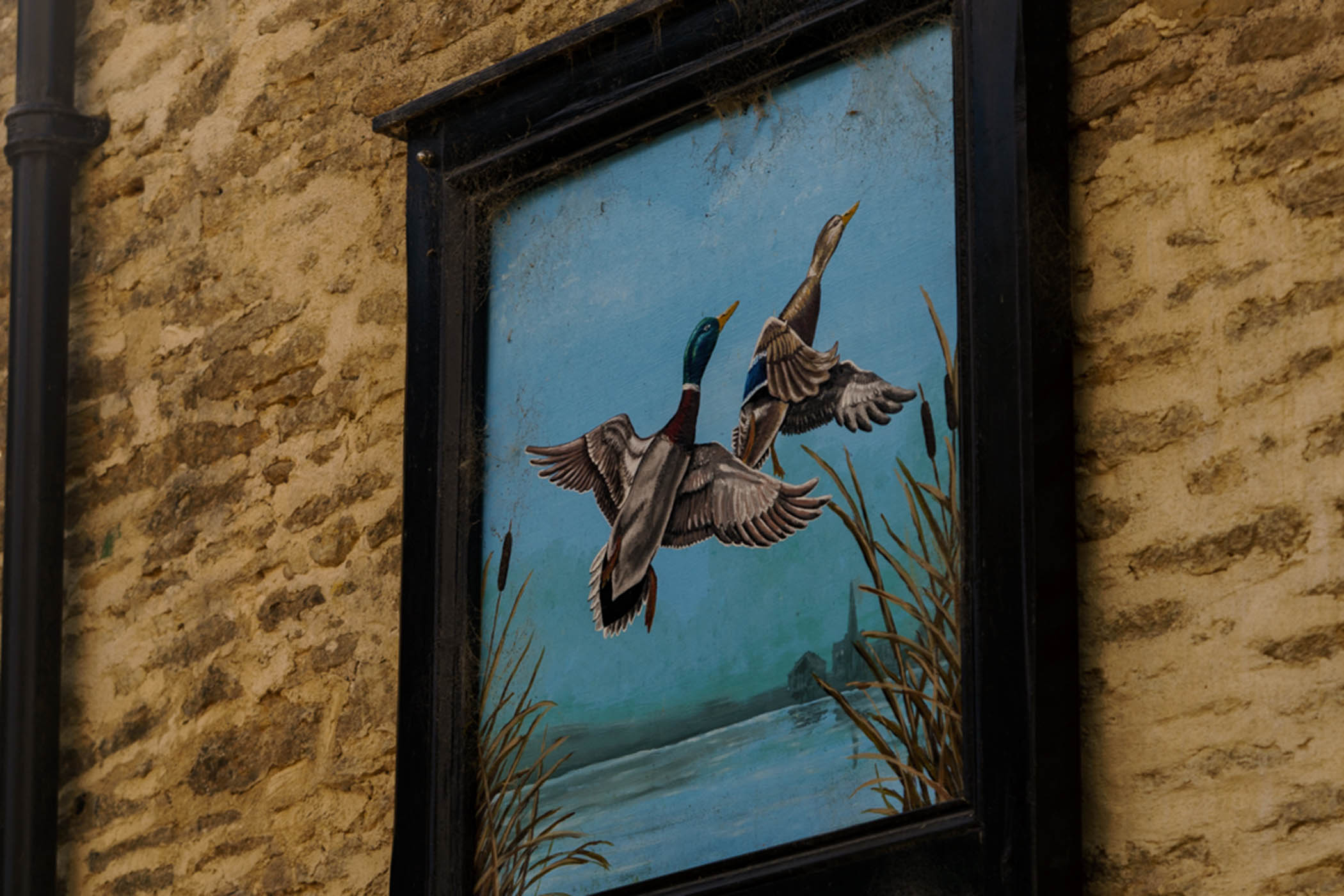Photographs Nico Froehlich
Some years ago, while driving south from the Scottish Highlands, I saw a woman standing in the rain by a roundabout with her thumb out. She was in her 70s, carrying a big bag, smiling at passing cars. I slammed on the brakes and gave her a ride. She had missed the last bus to Glasgow, she told me, and had been forced to hitchhike instead, a practice not unusual for her. We shared a winding journey together, one I recall being full of laughter and stories, of deep truths that somehow seemed safe to share. I was 21 at the time, a student at St Andrews, nearly finished with an undergraduate dissertation about the philosophy of happiness. (I was, in fact, on my way home from a solo surf trip meant to clear my head.) I remember thinking of the experience as completely improbable. Hitchhiking was something I had seen in films, read about in books. It had only ever been a relic from the past.
I hadn’t thought about this experience until recently, when I noticed that hitchhiking was undergoing a kind of nostalgic resurgence among friends of mine, most of them in their late 20s, as well as in the news and on social media, helped in part by television shows like Race Across the World. The BBC reported recently, “If social media is any indicator, the nearly half a million Instagram posts tagged #hitchhiking suggests the retro travel method is returning.”
Readers from older generations – baby boomers, particularly – might fondly recall hitchhiking as an affordable, environmentally friendly travel option; something people just did. (An older friend of mine remembers regularly seeing people crowding at the bottom of the M1, hoping for long rides north; he too picked up lifts there.) But for a younger generation, a cohort increasingly sick of providing payment to big tech companies in the form of their attention, hitchhiking seems to offer a form of escape. My friends have started to use dumb phones and 35mm cameras and paper maps, and are finding ways to live in alternative ways, in boating communities and rural co-operatives. Many of them are taking long digital detoxes, if not ditching the internet altogether. They might consider hitchhiking as a logical extension of this revised approach to modern life: an opportunity to detach from a vapid online world, where connection is shallow and fraught, and a way to immerse themselves more deeply in the real one. Discussing hitchhiking with friends recently, I recall thinking of it not just as travelling, but travelling with the intention of finding connections lost elsewhere.
Earlier this summer I hatched a plan to spend a month travelling from the bottom of the UK to the top, without a smartphone. I was to leave the internet behind and exclusively rely on hitchhiking as my only form of transport. I thought of the trip as a radical opportunity to reclaim my attention while meaningfully connecting with strangers. I would travel by train from London to Cornwall, find a roadside, and stick out my thumb and head north. Then, much like the lady I encountered in Scotland almost a decade ago, I would hope.
It was raining when I arrived in Penzance. I covered my hiking bag and trundled out to the edge of town, where I waited nervously in the lay-by of a dual carriageway. Was I expecting to pick up a ride immediately? Perhaps. But I was there for half an hour, and only a few drivers smiled at me. Most ignored me entirely. When the rain stopped a few lads drove past in a van and honked – they were laughing, I noticed – and for a brief moment I thought maybe they would offer me a lift, instead they offered me a middle finger. My fortunes changed when I moved to a quieter road nearby, where I was almost immediately picked up by a burly, tattooed plumber called Olly, who explained in great detail how the meaning of life was probably fishing. When he dropped me at a beach I was alone for five minutes before I was picked up again, this time by two women on their way for a sea swim in celebration of their being three years clean. And a short while later I joined a surfer called Woody – a dude who “always” picked up hitchhikers, he told me – and who dropped me at a service station, where a lorry driver offered me a longer ride to another service station, this one on the outskirts of Bristol.
After the Penzance to Portreath, Perranporth and Bristol leg of the trip, the pace continued similarly quickly. Redbrook to Abergavenny to Brecon and on further into Wales – each ride with a different driver, a different story, a different experience for us both.
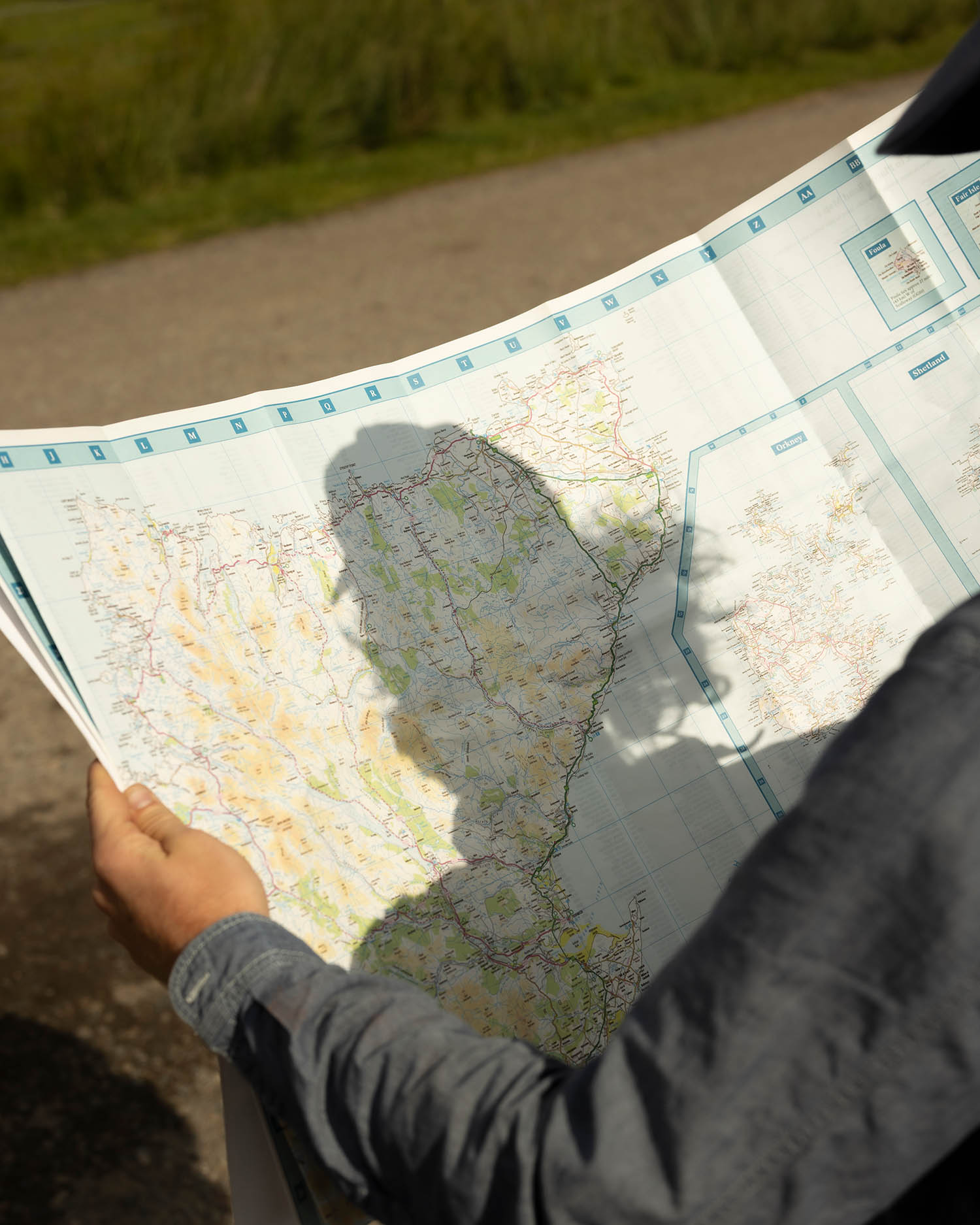
One morning, when I was standing in Redbrook, near Monmouth, I was given a ride by a lady called Jenny. She was running late for work – it was her young son’s birthday – and yet still she stopped. “I always try to pick up hitchhikers,” she told me, “so long as they don’t look crazy.” She recalled tales of great adventure, of hitchhiking around New Zealand when she was my age, of freedom. When I told her I was doing this trip without a smartphone, we talked about the rise of social media, how some of the most highly paid people in America have spent the last decade or so making social platforms as addictive as possible, how young minds don’t stand a chance. She was a paediatric doctor, she told me, whose patients present with symptoms such as low energy, difficulty sleeping, depression. “These young people on their phones every night until two or three in the morning,” she said, “being fed largely harmful content by social media platforms… It’s hurting them.”
I found soon enough that by travelling without a phone, I had actually eliminated a huge hurdle to connection. I was forced to speak with everyone: to ask for rides, for directions, for general information. Interacting with people is a skill that is easily forgotten, a muscle that must be worked. The more I did it, the easier it became to bypass small talk and get straight to a point of connection.
And connection matters, particularly among young people. We are in the midst of loneliness and mental health epidemics. In July, the World Health Organisation reported that between 17-21% of individuals aged 13-29 reported feeling lonely, with the highest rates among teenagers. In the UK, suicide is the main cause of death for people under 35 – on average around five young people take their life every day. Much of that loneliness comes from an absence of real-world connection that, I soon realised, it’s possiblefor hitchhiking to provide. As I moved from car to car, I became immersed, for as long as each ride lasted, in another person’s life, and they in mine. Here were a series of opportunities for profound connection with people I would never have met in normal day-to-day life.
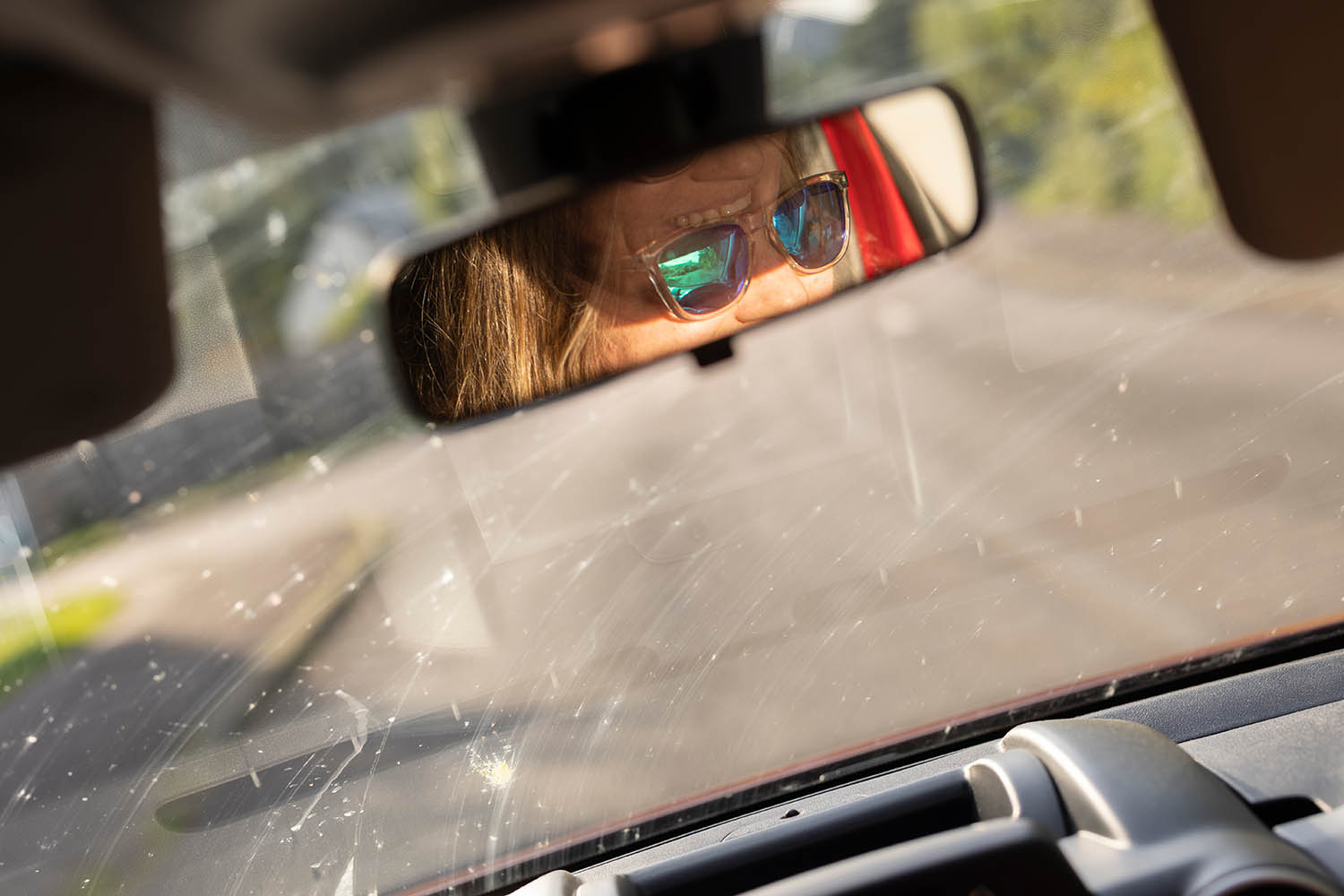
“In a time when social connections with strangers are so often algorithmically regulated,” the writer Andrew Fedorov reported recently in The Atlantic, “the unexpected, serendipitous meetings from hitchhiking can be all the more powerful because they’re so much rarer.”
Are we entering a new golden age of hitchhiking? We might be. Not long into my journey, I began to believe that if more people would hitch, society might heal, if only a little bit. I had exclusively excellent experiences with strangers. I was out in the real world, exploring, on a quest – seeing that people were actually good and kind and willing to help. I thought from time to time of the risk, of the potential danger involved with hopping into the cars of strangers, but I didn’t think of those risks frequently – a male privilege no doubt – so few were the moments that felt to me in any way perilous. (Both my partner and my mother were tracking me via an AirTag attached to my backpack.) Even in the 1970s, when hitchhiking was common, the highway patrol of California conducted a study on the practice’s safety and found that, of an estimated 5.2m hitchhiked rides taken during a six-month period, only two homicide cases involving hitchhiker victims were opened, around 0.00004% of journeys. The same study found that of 1m rides, just 390 crimes were committed in which hitchhikers were the victims. (It is more difficult to find contemporary figures, most probably because far fewer people are hitching rides; there hasn’t been a negative hitchhiking news story for years.)
Exactly why hitchhiking became unpopular remains a mystery, but the drivers on my trip had their own theories. One is that it stopped after one too many sensationalised newspaper articles about its potential dangers. Some thought it stopped after horror films shocked audiences with fictionalised hitchhiking murderers. Another suggested that, as car ownership has risen, people have come to rely less on hitching rides. There is also some suggestion, easy to believe, that cultural shifts have led to people becoming more afraid of each other, that society has become far less about collective experience.
Here were a series of opportunities for connection with people I’d never have met in normal life
Here were a series of opportunities for connection with people I’d never have met in normal life
A couple of weeks into my journey, while I stood waiting for a lift outside a museum in North Ayrshire, a woman called Rebecca approached me on foot and offered some advice on safety. She was 34 and had epilepsy, which prevented her from driving, and she lived in a remote part of Scotland serviced only by unreliable public transport. She had hitchhiked almost every day since she was 14 out of necessity, she told me, and she had “never once had a problem.” She went on, “The trick to safety is this: as a hitchhiker you have a choice of who picks you up. Never put your thumb up to fancy sports cars, or cars with tinted windows, and if a car stops and you get even the slightest funny feeling from the driver, apologise and say no thank you.” She winked. “If that doesn’t work, say you have a bad stomach, and that you’re soon to throw up.”
From Wales, I had travelled north to Scotland, via Liverpool and Lancaster to an industrial estate in Inveralmond, near Perth; through Keith and Elgin and Nairn. In Inverness, I was joined by Nico Froehlich, a photographer dispatched by this magazine. He had arrived by train and disembarked full of energy. This was his first time properly exploring Scotland – he grew up and had lived his whole life in south London. Soon he was to learn of midges, of the Scottish summer’s endless golden hour, of the country’s otherworldly beauty.
Hitchhiking is more difficult, though, when you are two men and not just one. Lifts were hard to come by with both of us roadside. So, after a few very long waits in the beating hot sun, we changed tacks: Nico hid while I flagged down cars. Whenever someone stopped, I would explain that there were actually two of us, Nico would appear suddenly with a broad and beaming smile, and we would get in the car before any politeness elapsed.
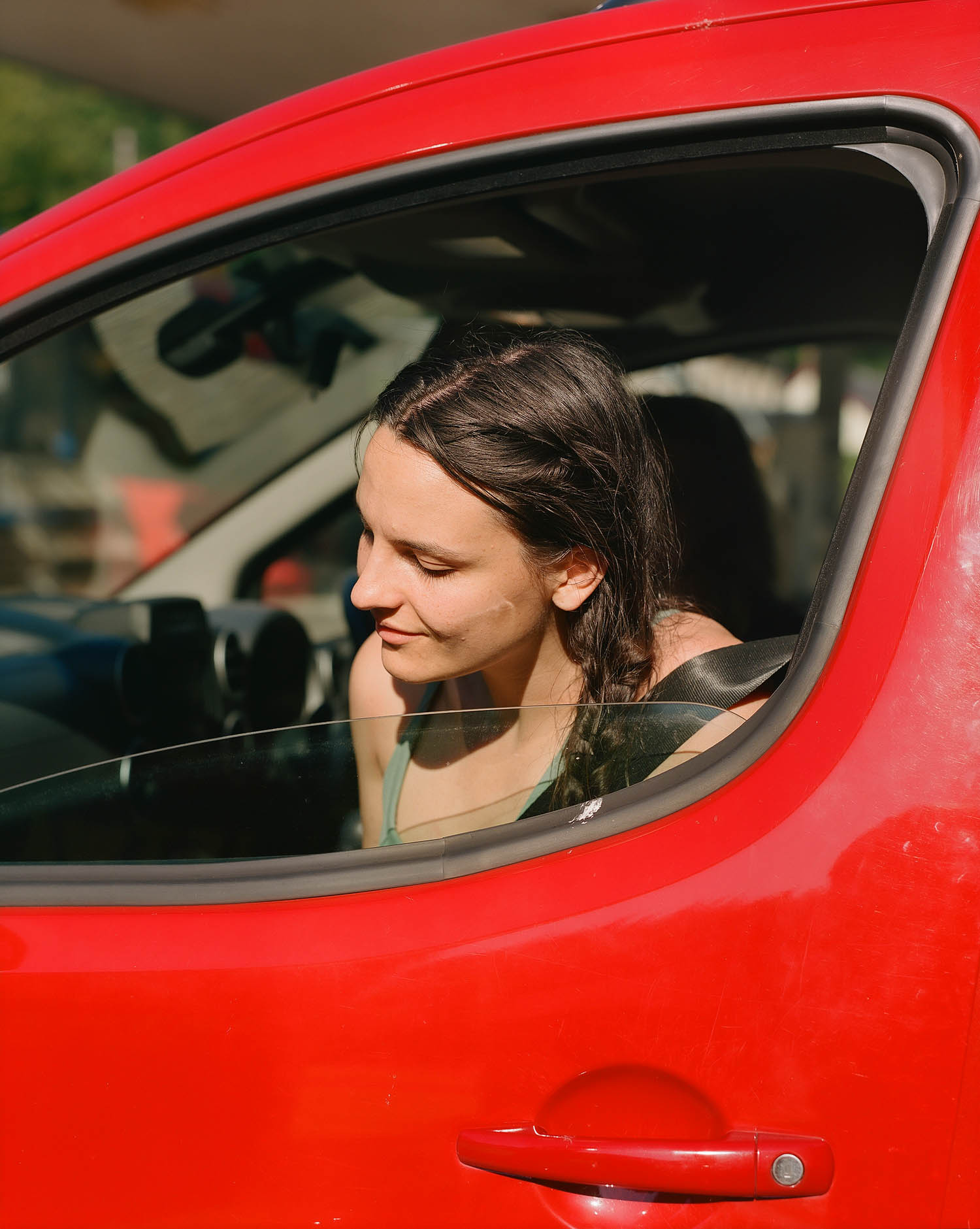
Still, it was slow going. At one point we waited, in the far end of nowhere, miserable and dehydrated, for hours. Moments before all hope was completely lost, two girls of similar age to us appeared in a bright red car and pulled over. We jumped in, and they showed us an evening of ceilidh dancing in Inverness, as well as offering us a place to stay, whisky, homemade shortbread, a shower, a washing machine, and endless kindness. The following day, one of the girls drove us to Far Beach at Redpoint, near Gairloch, and we camped on the remote, white sandy beach, swam in the sea with curious seals, danced and drank whisky around a bonfire. Nico was given a ride back to the city the following morning, and I remained in this remote bit of the Highlands alone, accompanied only by the odd house, surrounded by vast mountains reaching desperately up into the clouds.
After a couple of weeks, nearly 30 rides, and likely over 1,000 miles, I reached Ullapool, a fishing town on the complete opposite end of the country to Penzance, where I spotted a harbour full of sailing yachts. I had been running out of road and wondered if I could hitch a ride on the water. When I approached the harbour, I noticed an old bearded sailor, with two pairs of glasses on his head, standing next to a beaten-up sailboat. One of its windows had been smashed, and then seemingly patched up with a chopping board. Perfect, obviously. Ben was intrigued by my adventure, but initially he was apprehensive about giving me a ride. He was accustomed to sailing alone, he told me. I reassured him I could be useful, that I would bring all of my own supplies. Eventually, he seemed just about willing to take me on as crew for a voyage around the isle of Skye, towards his home on a small island near Oban. We were to depart the following day.
A few hours later, when the initial excitement of having secured a ride began to wear off, I began to wonder if it was a good idea to set sail with an old man on a rickety old boat into some of the most technically difficult sailing waters in the world. I couldn’t stomach food for the 24 hours before we set sail.
What felt like a lifetime later, we set off. I sat, feeling woozy, listening to the engine gargle and glug for hours. The wind was against us. We punched into it.
The hitchhiking experience felt different this time. Normally a driver and I would have only a short amount of time together, and I’d launch into conversation. But here the journey began quietly. And with silence between Ben and I, the outside world got louder: small white birds sung synchronised chirps and danced patterns in the air, a group of dolphins swam by. Ben pointed to a magnificent fat seal sitting on a rock, and a heron swooped past to perch and observe what the ocean had to offer for dinner. I was slowly growing accustomed to Ben’s pace, learning from him how to observe the world. That evening, when we anchored, he showed me how to echo the strained whining barks of seals. It became the evening’s entertainment: an old man and a younger one, bobbing together on a rickety boat, barking at seals.
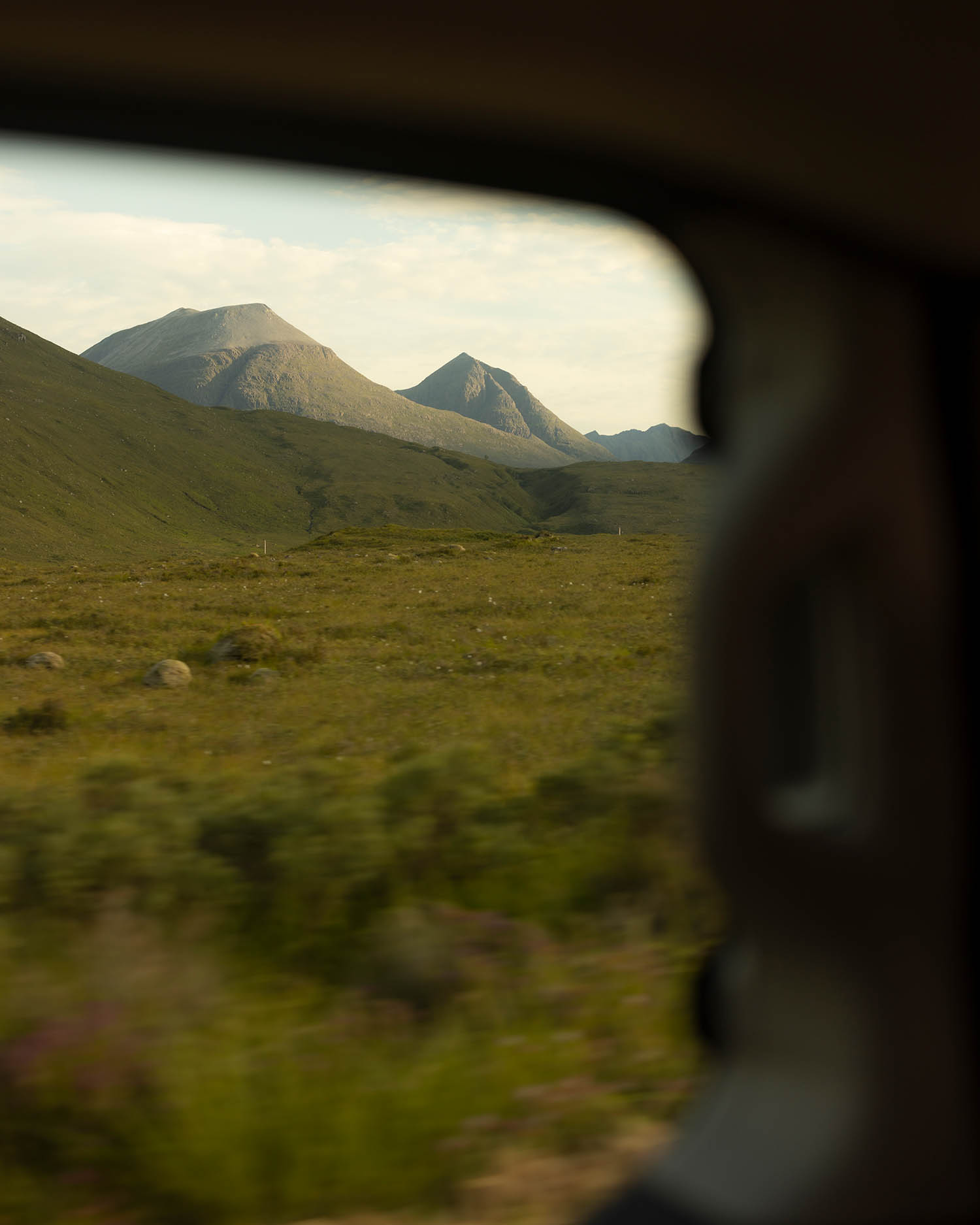
That day we sailed for hours, a perfect 20 knots of wind and crisp little waves. As we neared land, Ben fired up the engine, and it kicked out great white clouds of smoke and died. I took the helm, tacked, and Ben – an 82-year-old man – clambered down into the engine bay, took apart the fuel system, disconnected and circumvented the day tank (which he suspected was full of bad diesel), used old hydraulic hoses in the place of fuel lines, bled the system and the injectors, and an hour or so later the engine was up and running and we steamed to shore.
We continued like this for a week, sailing in the morning before some significant technical fault required repair, sitting around in the afternoons, staring out to sea.
On one particular afternoon, I asked Ben if he ever got bored. “I’m bored now,” he said. There was silence for a full 10 minutes. Then he went on, “But I’ve realised something, that you can sit through boredom, and on the other side is something interesting.” It dawned on me that, when I have a phone, boredom is impossible. Without it there is a kind of freedom. “When you are deeply bored, but you are at peace with it, then you are enlightened,” Ben said. And on we sailed.
Newsletters
Choose the newsletters you want to receive
View more
For information about how The Observer protects your data, read our Privacy Policy
